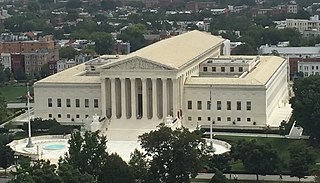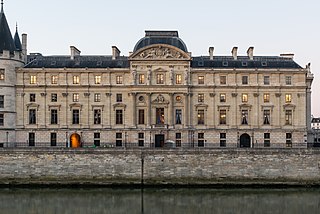Related Research Articles

United States appellate procedure involves the rules and regulations for filing appeals in state courts and federal courts. The nature of an appeal can vary greatly depending on the type of case and the rules of the court in the jurisdiction where the case was prosecuted. There are many types of standard of review for appeals, such as de novo and abuse of discretion. However, most appeals begin when a party files a petition for review to a higher court for the purpose of overturning the lower court's decision.

A court of appeals, also called a court of appeal, appellate court, appeal court, court of second instance or second instance court, is any court of law that is empowered to hear an appeal of a trial court or other lower tribunal. In much of the world, court systems are divided into at least three levels: the trial court, which initially hears cases and reviews evidence and testimony to determine the facts of the case; at least one intermediate appellate court; and a supreme court which primarily reviews the decisions of the intermediate courts, often on a discretionary basis. A particular court system's supreme court is its highest appellate court. Appellate courts nationwide can operate under varying rules.
Jurisdiction is the legal term for the legal authority granted to a legal entity to enact justice. In federations like the United States, areas of jurisdiction apply to local, state, and federal levels.
A precedent is a principle or rule established in a previous legal case relevant to a court or other tribunal when deciding subsequent cases with similar issues or facts. Common-law legal systems often view precedent as binding or persuasive, while civil law systems do not. Common-law systems aim for similar facts to yield similar and predictable outcomes, and observing precedent when making decisions is the mechanism to achieve that goal. Common-law precedent is a third kind of law, on equal footing with statutory law and subordinate legislation in UK parlance – or regulatory law. The principle by which judges are bound to precedents is known as stare decisis.
In the United States, a state supreme court is the highest court in the state judiciary of a U.S. state. On matters of state law, the judgment of a state supreme court is considered final and binding in both state and federal courts.
In the United States, a state court has jurisdiction over disputes with some connection to a U.S. state. State courts handle the vast majority of civil and criminal cases in the United States; the United States federal courts are far smaller in terms of both personnel and caseload, and handle different types of cases.
Mandamus is a judicial remedy in the form of an order from a court to any government, subordinate court, corporation, or public authority, to do some specific act which that body is obliged under law to do, and which is in the nature of public duty, and in certain cases one of a statutory duty. It cannot be issued to compel an authority to do something against statutory provision. For example, it cannot be used to force a lower court to take a specific action on applications that have been made, but if the court refuses to rule one way or the other then a mandamus can be used to order the court to rule on the applications.
In law, certiorari is a court process to seek judicial review of a decision of a lower court or government agency. Certiorari comes from the name of an English prerogative writ, issued by a superior court to direct that the record of the lower court be sent to the superior court for review. The term is Latin for "to be made certain", and comes from the opening line of such writs, which traditionally began with the Latin words "Certiorari volumus...".

The Court of Cassation is one of the four courts of last resort in France. It has jurisdiction over all civil and criminal matters triable in the judicial system; it is the supreme court of appeal in these cases. It has jurisdiction to review the law, as well as to certify questions of law, to determine miscarriages of justice. The Court is located in the Palace of Justice in the 1st arrondissement of Paris.

A trial court or court of first instance is a court having original jurisdiction, in which trials take place. Appeals from the decisions of trial courts are usually made by higher courts with the power of appellate review. Most appellate courts do not have the authority to hear testimony or take evidence, but instead rule solely on matters of law.
A writ of coram nobis is a legal order allowing a court to correct its original judgment upon discovery of a fundamental error that did not appear in the records of the original judgment's proceedings and that would have prevented the judgment from being pronounced. The term coram nobis is Latin for "before us" and the meaning of its full form, quae coram nobis resident, is "which [things] remain in our presence". The writ of coram nobis originated in the courts of common law in the English legal system during the sixteenth century.
Discretionary review is the authority appellate courts have to decide which appeals they will consider from among the cases submitted to them. This offers the judiciary a filter on what types of cases are appealed, because judges have to consider in advance which cases will be accepted. The appeals court will then be able to decide substantive cases with the lowest opportunity cost. The opposite of discretionary review is any review mandated by statute, which guides appellate courts about what they can and cannot do during the review process.

The district courts of appeal (DCAs) are the intermediate appellate courts of the Florida state court system. There are currently six DCAs:

The Supreme Court of Florida is the highest court in the U.S. state of Florida. It consists of seven justices–one of whom serves as Chief Justice. Six members are chosen from six districts around the state to foster geographic diversity, and one is selected at large.

The Supreme Court of Nevada is the highest state court of the U.S. state of Nevada, and the head of the Nevada Judiciary. The main constitutional function of the Supreme Court is to review appeals made directly from the decisions of the district courts. The Supreme Court does not pursue fact-finding by conducting trials, but rather determines whether legal errors were committed in the rendering of the lower court's decision. While the Court must consider all cases filed, it has the discretion to send appeals to the Nevada Court of Appeals for final resolution, as well as the power to determine the jurisdiction of that court.
In law, the standard of review is the amount of deference given by one court in reviewing a decision of a lower court or tribunal. A low standard of review means that the decision under review will be varied or overturned if the reviewing court considers there is any error at all in the lower court's decision. A high standard of review means that deference is accorded to the decision under review, so that it will not be disturbed just because the reviewing court might have decided the matter differently; it will be varied only if the higher court considers the decision to have obvious error. The standard of review may be set by statute or precedent. In the United States, "standard of review" also has a separate meaning concerning the level of deference the judiciary gives to Congress when ruling on the constitutionality of legislation.
The Judiciary Act of 1925, also known as the Judge's Bill or Certiorari Act, was an act of the United States Congress that sought to reduce the workload of the Supreme Court of the United States.

A supreme court is the highest court within the hierarchy of courts in most legal jurisdictions. Other descriptions for such courts include court of last resort, apex court, and highcourt of appeal. Broadly speaking, the decisions of a supreme court are not subject to further review by any other court. Supreme courts typically function primarily as appellate courts, hearing appeals from decisions of lower trial courts, or from intermediate-level appellate courts.

The South Carolina Court of Appeals is the intermediate-level appellate court for the state of South Carolina.
In law, an appeal is the process in which cases are reviewed by a higher authority, where parties request a formal change to an official decision. Appeals function both as a process for error correction as well as a process of clarifying and interpreting law. Although appellate courts have existed for thousands of years, common law countries did not incorporate an affirmative right to appeal into their jurisprudence until the 19th century.
References
- 1 2 3 4 5 6 7 8 9 Cope, Gerald (January 1993). "Discretionary Review of the Decisions of Intermediate Appellate Courts: A Comparison of Florida's System with Those of the Other States and the Federal System". Florida Law Review. 45 (1): 23–49 – via UF Law Scholarship Repository.
- ↑ Poortvliet, Kenneth. "Discretionary Jurisdiction: Definition & Cases". study.com. Retrieved 2023-02-17.
{{cite web}}: CS1 maint: url-status (link) - 1 2 3 4 5 Baum, Lawrence (February 1977). "Policy Goals in Judicial Gatekeeping: A Proximity Model of Discretionary Jurisdiction". Midwest Political Science Association. 21 (1): 13–35. JSTOR 2110445 – via JSTOR.
- ↑ "How Courts Work". www.americanbar.org. Retrieved 2023-04-03.
- 1 2 3 4 5 6 7 McKenna, Judith A. (December 1994). Structural and Other Alternatives for the Federal Courts of Appeals. DIANE Publishing. p. 7. ISBN 978-0-7881-1575-2.
{{cite book}}: CS1 maint: date and year (link) - 1 2 M. Oldfather, Chad (2010). "Error Correction". Indiana Law Journal. 85 (1): 49–85 – via via Digital Repository at Maurer Law.
- 1 2 3 4 5 "Taking the Pathway of Discretionary Review Toward Florida's Highest Court". The Florida Bar. Retrieved 2023-04-03.